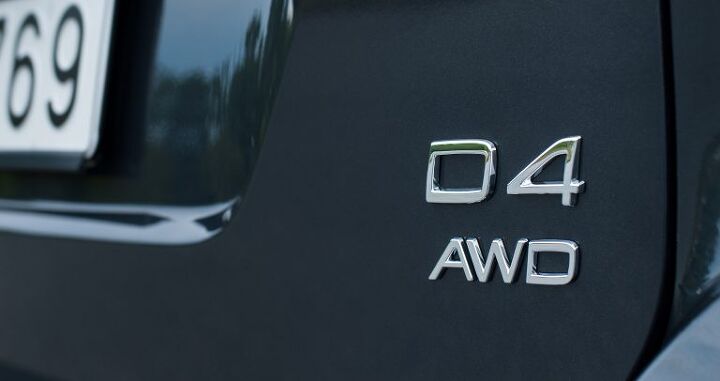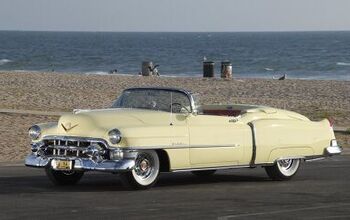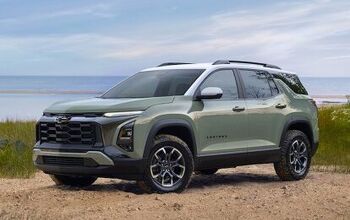Volvo Won't Pursue Diesel Development Any Further Than It Already Has

Volvo Cars is prepared to lower the curtain on diesel engines. Rising standards for nitrogen oxide emissions — and the cost associated with reducing them — has guided the automaker away from oil burners and into the loving arms of gasoline. “From today’s perspective, we will not develop any more new generation diesel engines,” CEO Hakan Samuelsson told Germany’s Frankfurter Allgemeine Zeitung.
That is not to suggest Volvo won’t get some serious mileage out of its last batch of diesels, though. The automaker has no plans to abandon the motors outright, suggesting it could march onward with its current lineup for at least a few more years. Diesels would also help Volvo meet corporate fuel economy targets while it gets new super-economical electric powerplants ready for market.
“We have just launched a brand new generation of petrol and diesel engines, highlighting our commitment to this technology. As a result, a decision on the development of a new generation of diesel engines is not required,” Samuelsson said in an interview with Reuters.
However, that commitment only goes so far as to update the existing VED4 and VED5 mills to keep them compliant through roughly 2023 — when Volvo feels confident it will no longer need them. Their replacements will come in the form of hybrid and electric units, with the first BEV arriving in 2019. While the company has dabbled with diesel-hybrid powertrains, they’re unlikely to persist, especially considering its new four-cylinder policy. The D5 Drive-E hybrid has been scolded for being costly without much added performance value and Volvo knows North America would rather see pure electric anyway.
“We have to recognize that Tesla has managed to offer such a car for which people are lining up. In this area, there should also be space for us, with high quality and attractive design,” Samuelsson explained.
He also said costs are becoming a serious impediment to diesel desirability, especially in Europe where most are sold. Volvo has to be careful how it plays its hand. Samuelsson noted that nine of every 10 XC90s sold in Europe are produced with diesel engines and about half of all new European vehicles are registered as diesel models. But with the European Union clamping down on carbon dioxide emissions and bans on diesel vehicles cropping up in a handful of cities, it makes little sense to pursue the technology for another generation.
The EU’s current mandate has CO2 fleet emissions dropping from 130 grams to a scant 95 by 2021, and the best way to do that is to pass the carbon buck to a power station by building more electric vehicles.

A staunch consumer advocate tracking industry trends and regulation. Before joining TTAC, Matt spent a decade working for marketing and research firms based in NYC. Clients included several of the world’s largest automakers, global tire brands, and aftermarket part suppliers. Dissatisfied with the corporate world and resentful of having to wear suits everyday, he pivoted to writing about cars. Since then, that man has become an ardent supporter of the right-to-repair movement, been interviewed on the auto industry by national radio broadcasts, driven more rental cars than anyone ever should, participated in amateur rallying events, and received the requisite minimum training as sanctioned by the SCCA. Handy with a wrench, Matt grew up surrounded by Detroit auto workers and managed to get a pizza delivery job before he was legally eligible. He later found himself driving box trucks through Manhattan, guaranteeing future sympathy for actual truckers. He continues to conduct research pertaining to the automotive sector as an independent contractor and has since moved back to his native Michigan, closer to where the cars are born. A contrarian, Matt claims to prefer understeer — stating that front and all-wheel drive vehicles cater best to his driving style.
More by Matt Posky
Latest Car Reviews
Read moreLatest Product Reviews
Read moreRecent Comments
- GregLocock Car companies can only really sell cars that people who are new car buyers will pay a profitable price for. As it turns out fewer and fewer new car buyers want sedans. Large sedans can be nice to drive, certainly, but the number of new car buyers (the only ones that matter in this discussion) are prepared to sacrifice steering and handling for more obvious things like passenger and cargo space, or even some attempt at off roading. We know US new car buyers don't really care about handling because they fell for FWD in large cars.
- Slavuta Why is everybody sweating? Like sedans? - go buy one. Better - 2. Let CRV/RAV rust on the dealer lot. I have 3 sedans on the driveway. My neighbor - 2. Neighbors on each of our other side - 8 SUVs.
- Theflyersfan With sedans, especially, I wonder how many of those sales are to rental fleets. With the exception of the Civic and Accord, there are still rows of sedans mixed in with the RAV4s at every airport rental lot. I doubt the breakdown in sales is publicly published, so who knows... GM isn't out of the sedan business - Cadillac exists and I can't believe I'm typing this but they are actually decent - and I think they are making a huge mistake, especially if there's an extended oil price hike (cough...Iran...cough) and people want smaller and hybrids. But if one is only tied to the quarterly shareholder reports and not trends and the big picture, bad decisions like this get made.
- Wjtinfwb Not proud of what Stellantis is rolling out?
- Wjtinfwb Absolutely. But not incredibly high-tech, AWD, mega performance sedans with amazing styling and outrageous price tags. GM needs a new Impala and LeSabre. 6 passenger, comfortable, conservative, dead nuts reliable and inexpensive enough for a family guy making 70k a year or less to be able to afford. Ford should bring back the Fusion, modernized, maybe a bit bigger and give us that Hybrid option again. An updated Taurus, harkening back to the Gen 1 and updated version that easily hold 6, offer a huge trunk, elevated handling and ride and modest power that offers great fuel economy. Like the GM have a version that a working mom can afford. The last decade car makers have focused on building cars that American's want, but eliminated what they need. When a Ford Escape of Chevy Blazer can be optioned up to 50k, you've lost the plot.


































Comments
Join the conversation
Let the Diesel Death Watch commence.
I think that the diesel death watch (DDW) began months ago when the VW Cheat news broke.